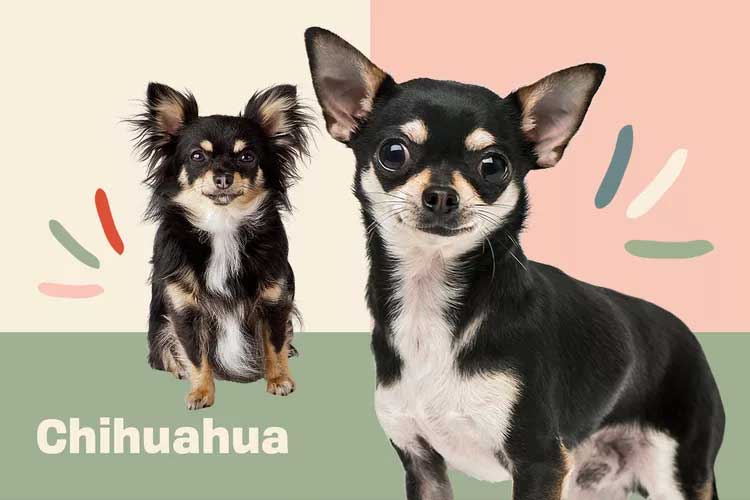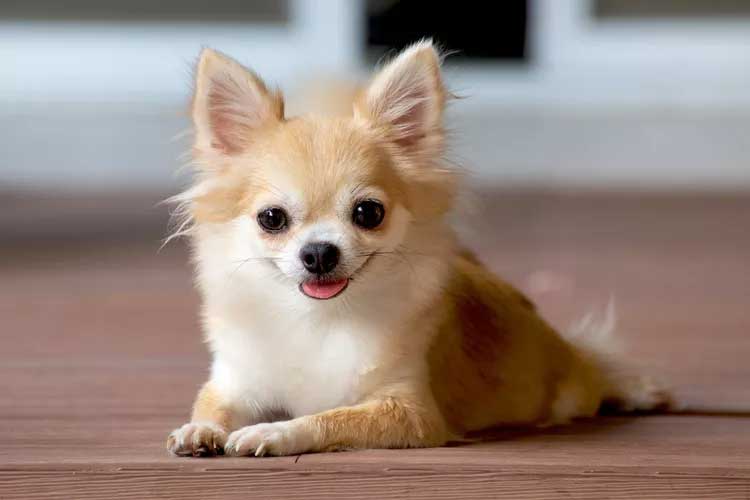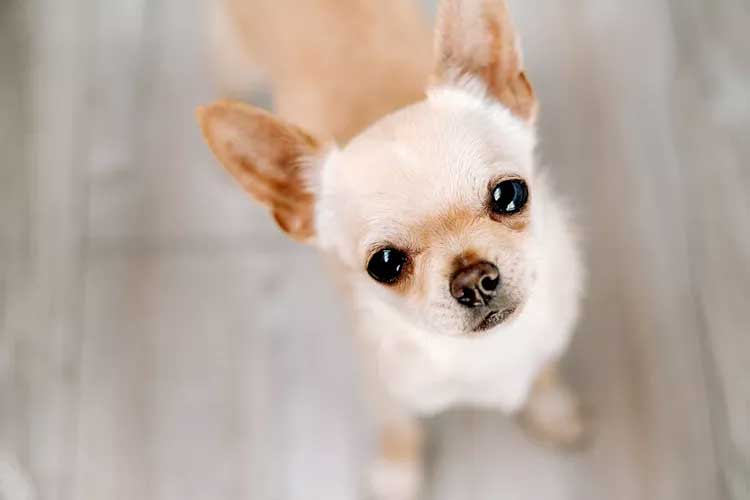
Chihuahua Overview
| OFFICIAL NAME | Chihuahua |
| COMMON NAME | Chihuahua |
| PET HEIGHT | 6 to 9 inches |
| PET WEIGHT | 3 to 6 pounds |
| LIFESPAN | 10 to 18 years |
| GOOD WITH | cats, families, seniors |
| TEMPERAMENT | anxious, gentle, playful |
| INTELLIGENCE | high |
| SHEDDING AMOUNT | infrequent |
| EXERCISE NEEDS | low |
| ENERGY LEVEL | active |
| VOCAL LEVEL | frequent |
| DROOL AMOUNT | low |
| BREED GROUP | toy |
| BREED SIZE | small (0-25 lbs.) |
| COAT LENGTH | long, short |
| COLORS | black, blue, brown / chocolate / liver, fawn, gray, white |
| PATTERNS | bicolor, black and tan, blue and tan, brindle, liver and tan, merle, tricolor |
| OTHER TRAITS | apartment-friendly, easy to groom, easy to train, good for first-time pet owners, prone to health issues, strong loyalty tendencies |
Chihuahuas come in a tiny package, but have big personalities they're not afraid to flaunt. While they are a charming breed, "Chis" (as owners affectionately call them) have a tendency to be a bit sassy. The Chihuahua Club of America actually refers to the breed's expression as "saucy."
But for all the sass and sauce, this toy breed is a devoted companion. "Chihuahuas are very loyal, loving pets," says Linda George, chair of the Judges Education Committee for the Chihuahua Club of America. "Chihuahuas that I have bred and raised usually remember me years after they have gone to another home."
Chihuahuas vary in appearance, as some have a shorter, smooth coat, while others have a longer coat. They also tend to live longer than many breeds: Owners can expect to care for their Chi for up to 18 years.
They are busy dogs and like to be close to their owner, often underfoot. Chihuahuas are also good watchdogs thanks to their stranger danger tendencies. More than just a "purse dog," Chihuahuas are a very alert breed that loves to be on the go with their owners. Get ready for people to "ohhhh" and "awww" over your pooch—and rest assured, your Chi will love it.
Appearance
Variety is the name of the game when it comes to how Chihuahuas look. There are two main types of coats: Smooth and long. Smooth coats are shiny and fit close to the body with a ruff of thick, longer hair at the neck. Long coats have softer fur that's flat or slightly curly, with a fringe of hair at the ears and a plumed tail. Long-haired Chihuahuas also have a ruff on the neck and longer hair on their feet, on their legs (which is referred to as "pants"), and on their stomach (called a "frill").
Their coloring and markings can be very different as well. Chihuahuas can be solid-colored black, white, fawn, chocolate, gray, or silver, with a range of shades for all colors. They can also be tricolor (in chocolate, black, or blue with tan and white, for instance), brindle, spotted, and merle.
Chihuahua heads can also vary: They can either have a rounder apple head or a deer-shaped head, which is narrower with a longer snout. And despite their small stature—they weigh anywhere from 3–6 pounds—Chihuahuas have big brains, making them quick-witted and easy to train. But because of their small bladder and strong-willed personality, they're not particularly easy to house train.
Temperament
Lapdogs through and through, Chihuahuas can't get enough time with their people. If they aren't snuggled up with you, they may be cuddled up under a blanket or curled up in a corner. Or they've managed to find a spot of sun to bask in.Owners say Chihuahuas are great conversationalists, sure to tell you if something is exciting or amiss around the house. They are excellent watchdogs—thanks to their bold personalities and terrier-like attitudes—as they are suspicious of strangers. As with all breeds, socialize your Chihuahua puppy so she can grow up to be comfortable around new people, animals, and situations — and not be so yappy. Typically, Chihuahuas bond to an individual person. They can warm up to others once properly introduced, but they do so on their own timeline.

Chihuahuas also seem to be in touch with their good looks and well aware of the attention it draws to them. So from the get-go, make sure you let your Chi know you're in charge. Never let your Chihuahua puppy do something that will be considered unacceptable as they reach adulthood: Their big personalities can lead them to dominate your life, if you let them. So be consistent in your expectations and use positive reinforcement training. They can develop undesirable behaviors if they're bored, and even become picky eaters. Establish house rules early on and be consistent in your training.
Living Needs
Thanks to their petite size, Chihuahuas are ideal pets for apartment dwellers, students (Elle Woods was on to something!), or those in a smaller home.Of course, having to take a dog outside when it's cold and wet is never any fun, and Chihuahuas could not agree more. "If you don't like taking the dog out on cold winter days, Chihuahuas are ideal since they can be taught to use a litter box or wee wee pad," George says. When you do take them out to do their business or to get some exercise, don't leave them alone in the yard: They could be attacked by a bird of prey or other larger animal.
Chihuahuas will definitely rule the roost, so to speak. Keep in mind Chihuahuas, as with any dog, can get into trouble if they haven't been socialized from a young age. If they get into a yappy argument with another dog, even a much larger one, their spunky nature means they won't back down. But if they are properly socialized, they'll do well with other dogs in the home (especially other Chihuahuas), and even with cats.
As charming as Chihuahuas are with their owners, they can be suspicious of humans they don't know. And although they can get along with older children, they're not an ideal dog for families with super young kiddos, as they are just too fragile for toddler playtime. A Chihuahua may leap from a child's hands and injure herself if she's not being held correctly, so make sure to supervise your kids around these tiny pups and teach them how to interact with small animals.
Care
"Chis are easy to care for," George says. "Even the long coats require little grooming." For smooth-coat Chihuahuas, that means occasional brushing and regular baths. Long-haired Chihuahuas should be brushed once a week to avoid tangles or matted fur. Both coats don't shed much, except minimally once or twice a year.George also recommends brushing their teeth at least every other day, as poor dental care can lead to other health problems. Thier nails, which grow quickly, should be trimmed regularly for all Chihuahuas. And if your pup develops tear stains beneath her eyes, you can carefully wipe them to remove discharge.
Their tiny size doesn't do much to keep them warm, so naturally, Chihuahuas don't tolerate the cold well. You may also see them shiver when they're overly excited or stressed. But they're also born fashionistas, and your Chihuahua won't mind being dressed up in a sweater or coat.
When it comes to dinner time, make sure you provide high-quality food in the right amount for your Chihuahua's age, as they are prone to becoming overweight. Check with your veterinarian for guidance.
Exercise will help as well, as even older Chihuahuas may surprise you with their energy level. Up for playing as long as you want, Chihuahuas enjoy walks, supervised romps around the yard, and retrieving toys. They can go-go-go until they drop, so don't let them tire themselves out too much, especially on hot days.
Chihuahuas need 20–30 minutes of exercise daily, but this need can be met by them just following you around the house all day (which just so happens to be a favorite pastime). Chihuahuas are also fast learners: They can compete in agility and obedience trials with just as much enthusiasm and success as larger dogs, and remain curious and bold throughout their life.
Health
These tiny pups are generally a pretty healthy breed. Most Chihuahuas live to be at least 10 years old and can live to be an impressive 18 years, but they may develop health issues as they age.Some potential health issues to be aware of, according to the CCA, are folic acid, heart disease, patellar luxation (loose kneecaps), hypoglycemia, and epilepsy. Additionally, a Chihuahua's ears can be prone to earwax build-up and dry skin. The CCA says that before you bring home a pup, ensure your Chihuahua breeder completes all health tests recommended by the OFA. If you're adopting a Chihuahua, ask for all available medical information.
One common occurrence with Chihuahuas is the presence of molera, a small, pencil-eraser-tip-size hole in the top of the skull. "Historically this was a sign of breed purity," George says, noting the presence of molera, which is much like a soft spot on a newborn baby's head, is not an indicator of health problems later in life. Whether a Chi keeps its soft spot depends on size, genetics, and skeletal structure.

History
While the Chihuahua's origin isn't crystal clear, two main theories exist. One says Chihuahuas descended from a Central or South American dog known as the techichi (sometimes spelled techihi), a larger version of the Chi dating back to the 9th century and the Toltec civilization. The Toltecs were conquered by the Aztecs, who then made techichi prominent in their society, as they believed the dogs had mystic powers—including the ability to see the future, heal the sick, and safely guide the souls of the dead to the underworld.Techichi lived in temples, were part of many rituals, and were buried with the dead. But when the Spanish conquered the Aztecs in the late 1500s, the techichi faded into obscurity. The dogs lived in remote villages, and when they were discovered by Americans visiting Mexico in the mid-1800s they were found mostly in the State of Chihuahua, thus gaining the name we know the tiny dogs by today, according to the CCA.
The second theory is that small hairless dogs from China were brought to Mexico by Spanish traders and then bred with small native dogs. Some say that perhaps Christopher Columbus played a role. These are the origins of short-haired Chihuahuas; the longhaired variety was probably created through crosses with papillons or Pomeranians. Whichever story is true, we do know likenesses of Chihuahuas are painted on artifacts from ancient times.
The first American Kennel Club-registered Chihuahua, Beppie, was recorded in 1908. Chis gained popularity as pets during the 1930s, 1940s, and 1950s—with help from famed musician and bandleader Xavier Cugat, who famously waved his baton with one hand while he held a Chihuahua with the other.
Fun Facts
Chihuahuas are natural performers and have appeared in many TV shows and movies, including "Sex and the City," Legally Blonde, and Beverly Hills Chihuahua.Remember the Taco Bell dog? A Chihuahua named Gidget made the phrase “¡Yo quiero Taco Bell!" unforgettable during the 1990s.
The world’s smallest dog, Brandy, is a Chihuahua measuring just 6 inches from her nose to the tip of her tail.
The minor league baseball team in El Paso, Texas, is named the Chihuahuas.